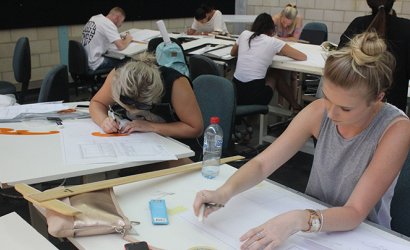

Why choose this course?
Create your career in digital cinema. This course will equip you with the skills and knowledge necessary to work within the film and television industry. It will provide you with the opportunity to explore the nature of storytelling through the medium of digital cinema and helps you to evolve your ideas for professional creative work.
The course covers skill areas such as lighting design, developing story lines and treatments, directing cinematography, managing performers and crews for screen productions and editing complex screen productions. You could find yourself working on content as varied as client-based corporate projects, micro dramas, documentaries and short-form narrative films with professional actors shot on cinema standard equipment.
Successful completion of this course may see you gain advanced standing for entry into the WA Screen Academy's Bachelor of Media & Communications at Edith Cowan University.
Career opportunities
- Assistant Director
- Editor
- Production Manager
When choosing a course, it's important to think about the key skills and knowledge you'll need, as well as how you'll be assessed. Take a look at this information and consider if you might face any challenges in meeting the course expectations and requirements.
- Ability to work collaboratively
- Creativity and vision
- Presentation and negotiation skills
- Leadership and management ability
- Planning and organisational skills
- Financial skills and the ability to work to a budget
- Ability to work well under pressure and meet deadlines
- Competent in Microsoft 365 applications - Word, Excel, PowerPoint
- Ability to work industry standard hours of 10 hour days
-
An IELTS score (academic) of 6.0 with no band score less than 5.0 or equivalent.
-
Completion of CUA51020 Diploma of Screen and Media (Film &Television) (AC75) is required for entry into this course.
There may be further semester intakes available for enrolment. You can view any further intakes when you submit your online application(opens in a new tab).
For information about pathways from TAFE to university, view our Pathways to university page.
How to apply
Apply to study at TAFE in six steps:
- find a course;
- check entry requirements;
- submit an application;
- accept your offer and pay;
- apply for your student visa; and
- receive your visa and come to Australia for your studies.
Build your own course guide
Select the study areas, courses and topics you like. Get your custom guide by email!
Download study area guide(opens in a new tab)
Contact us(opens in a new tab)
TAFE International Western Australia (TIWA) is the Registered Training Organisation (RTO) and Commonwealth Register of Institutions and Courses for Overseas Students (CRICOS) provider, for the delivery of training to international students, enrolled in a TAFE course in Western Australia. This nationally recognised course is delivered by a Western Australian TAFE college on TIWA's behalf. TIWA retains responsibility for the quality of the training and assessment delivered by the TAFE colleges and for the issue of certification documentation to students.


